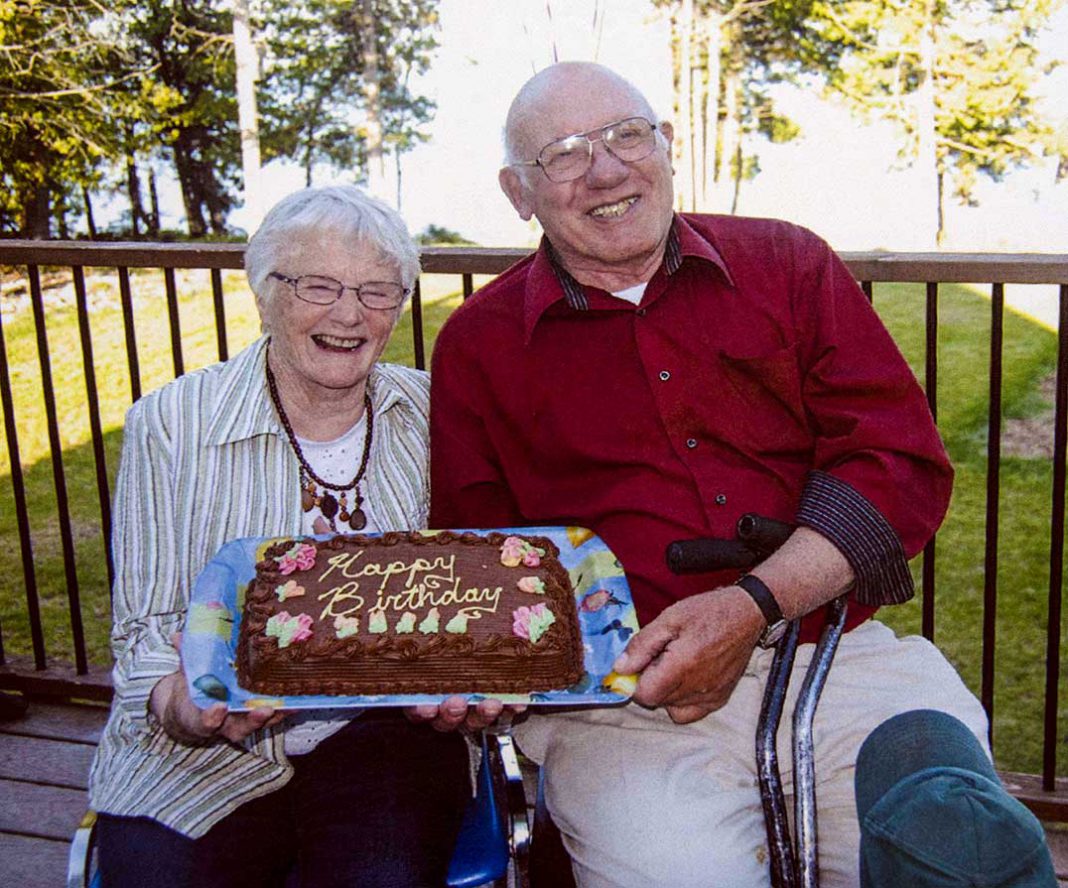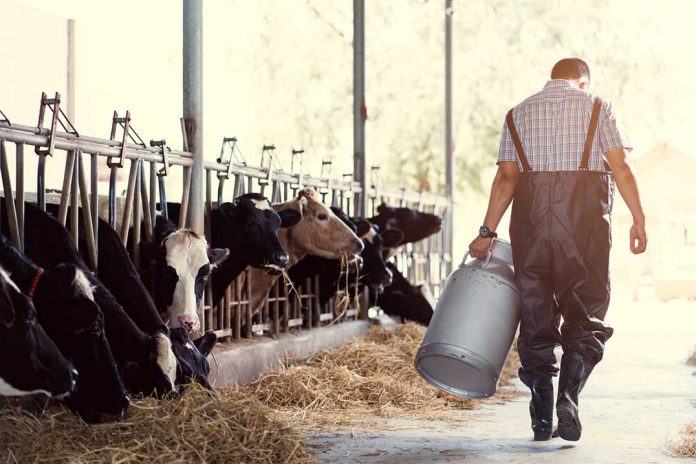The war years were very traumatic and difficult for Debbie Hietkamp in her native Holland. From her comfortable home in Gore Bay, she recalls the horror of that war. “We were close to the German border in Laren. I was eight when the war started with airplanes roaring over our home, and 12 when they came for my dad in the middle of the night, in July of 1944. They had found enough evidence of his underground work. He had been part of the fight to keep our young men from being sent to work in German factories. Their young men were fighting in the war. Our young workers had gone into hiding with the help of people like my father. He hid some in our own home during the day. At night, when the raids were more likely, they slept in the woods.”
“Dad gave each of us a kiss on the forehead, and it never occurred to us that this would be his last goodbye. The German soldiers took him to a camp and we never saw him again. Later, we heard from the Red Cross in June of 1945 that our father had died in German camp, in December of 1944. He was just 52 years old.”
“Our home was a bit like Grand Central Station. We had one family staying in our living room and another in the chicken coop area, as well as the young men who were hiding. In the last year of the war, 1945, the German soldiers were still taking over residences in Holland, inciting fights with the locals who were trying to protect their homes and families. When the soldiers left an area, they often ravaged what was left.”
“The German soldiers took our house over, leaving ammunition at the back, and we left for a neighbour’s home. One day we heard a lot of shooting, so we ran to the basement of another neighbour. The shooting continued all night long but when it got quiet the next day, the bigger boys went out to assess the lay of the land. We lived north of the canal which was hard for the arriving Canadians to get across. All the bridges had been bombed so we weren’t sure what we would find.”
“After a while the boys came back to us, very excited. ‘The Canadians are here, in a nearby house,’ they shouted. We started to run towards the house when we noticed a group of German soldiers advancing from behind the home. We all ran into the basement of this building. We soon heard shouts which struck horror in our hearts, ‘The house is on fire.’ We all ran out again, this time from the front door, crawling on our knees all the way to another neighbour. By noon it was all quiet.”
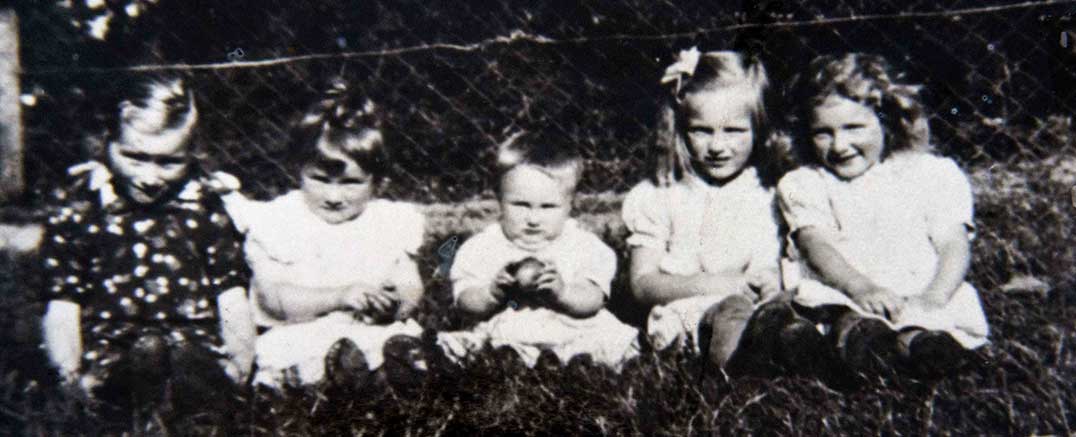
“We were very worried because mother was not with us. After noon, brother Hendrik and sister Rika returned to the site of the fire. They looked through the ashes and their worst fears were realized. Our mother lay dead in the ashes. She had been caught in the cross-fire between the Canadians and the Germans. She was 49 that April in 1945. While she lived, she had harboured the hope that our father would come home one day. Now both were lost within five months of each other, because of the war. Luckily, all five of their children made it through that terrible time.”
Debbie had begun her life on June 1, 1932, the daughter of H. J. and Dina (Meylink) Koeslag. Her siblings were Hendrik, Rika, Johanna, Dineke, Annie and Bertus. “My Dutch name is Dirkje and I use Debbie now. I am the second youngest.” The time after the war left indelible memories as well, even though the country was slowly coming back to life. “Our house survived the war. We had a family who lost their home, living in our semi-detached building.”

“One kind Canadian even gave me his accordion before he left. Our eldest brother Hendrik took over the farm. Bertus, who was only five, Johanne and I helped our brother with mixed farming tasks. We had pigs, chickens and 10 cows. We noticed that eggs would go missing occasionally. It seems some of the Canadian soldiers were hungry too, while the world was slowly coming back to a more normal sequence.”
The school had been taken over by the Germans in the war and had no benches left and for the first year after the war, there was no school. “We just helped out on the farm milking cows, feeding pigs and chickens. We were afraid of the roosters, they were mean.” Debbie recalls chasing one of the chickens around the yard trying to get it back in the coup before night. “I playfully threw a stick at it but managed to break its leg. I felt bad after that. We had a work horse on the farm too. He was so big, he terrified me when he got too close, so I tried to avoid him.” Slowly siblings left to establish their own lives. Sister Rika left for Canada. Another sister began to work for our maternal uncle and his wife, who had no children. Another sister became a midwife. Eventually, Debbie was left on the farm with her oldest and youngest brothers.
“When school started again, I took some courses in home economics. To get to the school, I had to use a pontoon boat to cross the canal because all the bridges had been bombed. Pontoon boats were popular in Holland after the war. Getting to school on time was hard because if the boat was on the other side, you had to depend on someone wanting to get to your side. Muscle-power was needed to get across the water. You pulled on an underwater cable that was lifted by a man who was tasked to lift it if someone needed to get across. Most of the time the cable was on the bottom of the canal so the bigger boats could get through. If we got to school late, we often used that as an excuse, even if the pontoon boat had not held us up.”
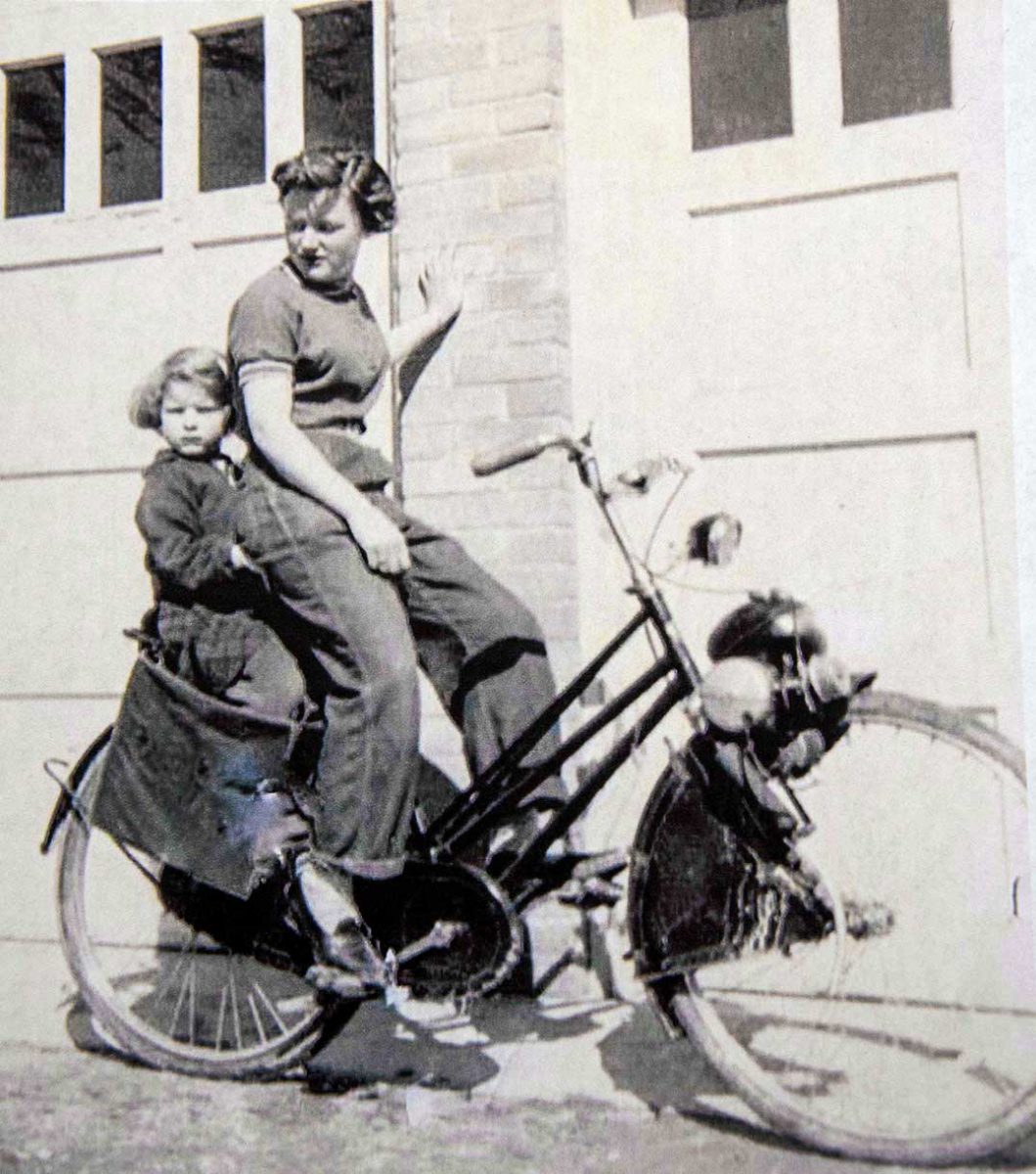
After a few years, going to school and helping on the farm was not inspiring anymore. “It felt as though something was missing in my life. I wasn’t happy, so in October of 1950, at 18, I travelled to Hoek in Holland. I followed my sister Rika to Canada.” Debbie got on the ship at Hoek and sailed to London. From there a train took her to Liverpool. A baby carriage for her new niece, two blue chairs and her bike with the little motor came with her. “I got on the Franconia, which left for Quebec City. My brother-in-law Henk (Hendrik) met me in Quebec. He and my sister were living in St. Anne de Bellevue, near Montreal, with their one-month-old baby, Henny. I soon found living with their family was more rewarding than my life in Holland had been.”
Debbie met other young people and soon felt at home in her new country. “I imagined that It was harder for the parents of young people who emigrated from Europe. They must have found learning the language took longer and the cultural differences made understanding a new way of life more challenging. It was much easier for young people.”

“While I was learning English, I did some domestic work for neighbours who had small children and needed help. I enjoyed looking at the basic ‘reader’ books for small children, learning the language. In time, I travelled to Montreal to learn English, shorthand and typing. One of the young ladies I met told me she had gotten a job at the bank, so I thought that was worth a try. As luck would have it, I got a work as a bank teller for the Royal Bank for the next two years. At that time, brother-in-law Hendrik started to work in Ayton, Ontario, for a big business, Fisher Poultry Farm near Hanover, so luckily, I got a transfer to a bank there. I wanted to stay with my family.”
It was here that Debbie met Be Hietkamp, who lived in Harrison at the time. “He joined our group of other Dutch immigrants, and I got to know him a little better. I still had my special bike to get around town. It had a motorized wheel and a small tank that held gasoline and oil. After a while, I worked in London where I met a lot of other young people, many from other countries, just like me. It was a good time to be young and single. When that work ended, I came back to Ayton.”
Debbie and Be fell in love and married on January 23, 1960 at the church in nearby Harriston. It was a mild day for January and the celebration went well. “We bought a farm in Moorefield, close to Harriston and purchased some dairy cows, a few pigs and two chickens.” The milk their cows produced was taken to Canada Packers in Harrison. Canada Packers was known for their ice cream at the time.
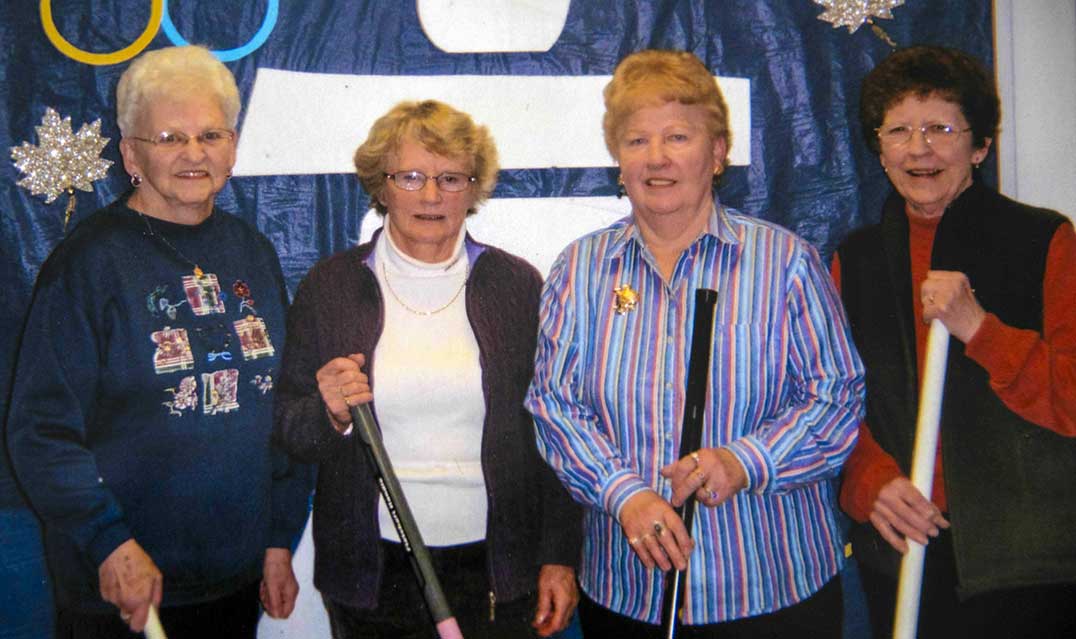
Be’s father had died in Holland when Be was an infant. Be’s stepdad, the only dad he had known, wanted to buy a farm in Gore Bay. He bought the Clover Hill Farm there in 1961. Three families moved to Manitoulin to a big house on the farm. Be and Debbie, Be’s brother-in-law Harry Vander Weerden and his wife Betty, along with the parents. They all moved into three separate living areas. “Our apartment was upstairs at the back.”
The three men were partners in an enterprise that raised dairy cows and sold milk to Waggs Dairy in Mindemoya. All three families were supported with this work, and in time the farm would be paid off. Debbie began to learn the art of quilting from other quilters and she took up curling which was popular in the winter. “Gore Bay had a lovely curling rink.”
Over the years, Be and Debbie became parents to five children, Jeff, Mike, twins Douglas and Caroline, and Nancy. Debbie also worked at the local Bank of Montreal and the credit union in Gore Bay. In her spare time, Debbie made quilts for her children and 15 grandchildren. The Hietkamps have one great-grandchild now.
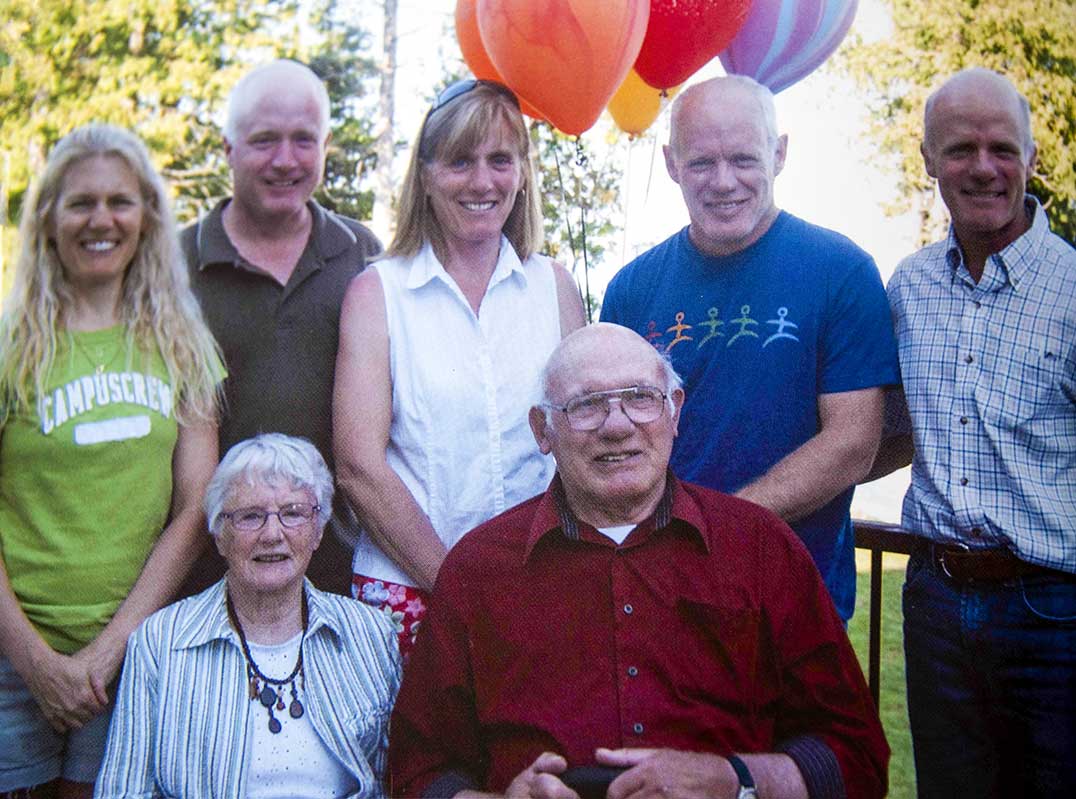
“The kids went to public school on the island and then high school. We seemed to have more interests in common when they reached high school,” Debbie explains. “I always enjoyed track and field and watching the kids participate. Ted Jackson was their coach for a few years and our oldest boy, Jeff, was in the ‘All Ontario’ running champ of 800 metres and 1,500 metres, three times. He won one gold, one silver and one bronze in those competitions.” Jeff and Ted spent a lot of time together, training and getting to sports events. Ted lived right on the corner of our farm, so it was perfect for get-togethers.”
Debbie and Be flew on a holiday trip to Germany to see the Oberammergau Passion Play in 2000. It was a six-hour flight, but much faster than the ships they had arrived on. “That trip to Germany was a special event for both of us; the Passion Play was well acted and very emotional when they put Jesus on the cross. It was all in German, but we really enjoyed it. It is only produced every decade and continues to be very popular.”
“Back home in Canada, celebrating the memorial of the end of the war in Holland, May 5, 1945 seems to affect me more, especially in recent years, than it did when I was younger. It is a time to remember the dead and celebrate freedom. Two minutes of silence by the people in the Netherlands are committed to annually at the peace monument on Holland’s Dam Square.”
“Another trip took us to Alaska. We flew to Vancouver and boarded the boat there. We saw a lot of beautiful scenery on our way to Juneau. The voyage included a train trip through the snow and ice as well as some bus travelling. On another trip lasting four days we took a train to Vancouver from Ontario. The prairies were beautiful, and we saw much of them while we had daylight. We boarded the ferry in Vancouver headed for Vancouver Island and finally to Victoria, to see a bit more of the west coast. Be’s sister-in-law, who lives in Victoria, picked us up and showed us around.” Mexico was yet another destination for the couple.
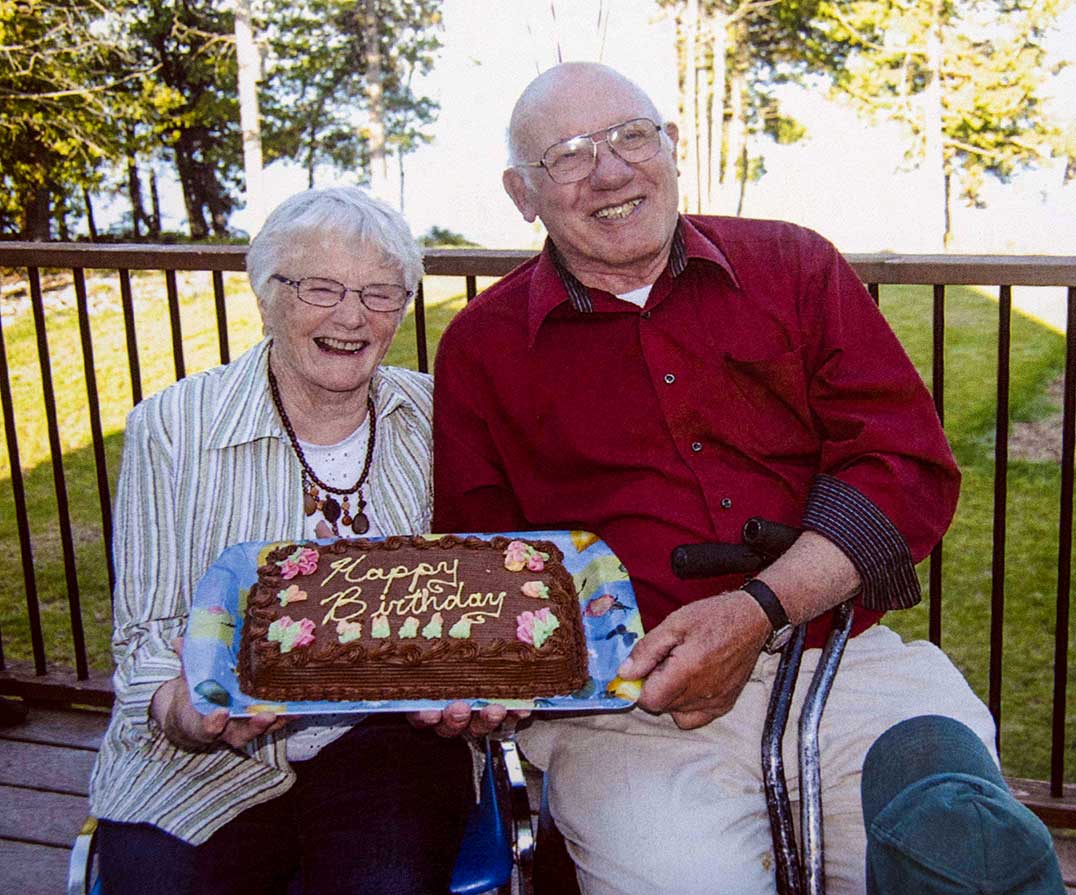
“We have also travelled back to Holland several times. I went back to my land of birth in 2005 to see my sister and my brother. I took all five of our children to show them a few places. Our old farm had been remodeled and one little building that housed the cows in the back has now been made into living quarters. In the 1940s small buildings like that were always used for four four-legged friends.”
On one trip to Holland for the couple, Be wound up with a serious infection and he had to be taken by ambulance to the new hospital where he remained for 16 days. Be was quite ill and he woke up one day wondering why everyone was speaking Dutch. “For a few minutes, he didn’t realize we had left Canada and come to Holland. It seems that we had good insurance and that covered the bill of $4,800 Euros.”
Another jaunt took the couple to the Vancouver World’s Fair. “We flew out to Calgary and took a bus to Vancouver the site of the fair. I remember eating Belgian waffles with fresh strawberries and whipped cream. It was wonderful. One Holland dish we still enjoy here at home is New Year’s cookies that are only made on that special occasion.” Be makes the unique dough and Debbie rolls the dough up and slices the cookies off. “It’s a special treat, enjoyed once a year. All our children make them too. We discovered that you can also buy these cookies, but with a chocolate batter, at a Dutch store in Guelph. Christmas Eve, it’s pancakes and sausages.” Nancy has followed in her mother’s footsteps and she makes them for her family too.
“In hindsight, Holland was no place for a peaceful home life for years after we left. I was just 12 when my parents died and although I was at loose ends for a while, I stayed for six more years until I got brave enough to join my sister in Canada. It is my hope that the world will find some peaceful solutions and stop all this fighting soon.”
“We would be very happy to go back to Holland one more time, but at this point we are not sure we will make it. Our travelling days seem to be over. Today there are only three of us left in my Holland family, the three youngest, Annie, Bertus and me. We have never regretted coming here, neither Be nor myself, because we love our life here on Manitoulin. This is really a special place. We just need to make sure the bridge stays fixed,” Debbie adds with a smile.
“We talk to people who arrive here to the harbour on their boats and they tell us this is a relaxing place to be. There are no big disasters and not likely to be any. We know several couples who have moved here to work and later retire. People on Manitoulin care about each other.” Debbie concludes. She gazes out the big picture window, “Our home overlooks the Gore Bay harbour and we enjoy this awesome view daily, from the shelter of our living room. We like to share it with our friends and family, recognizing that this is the best place to be.”

